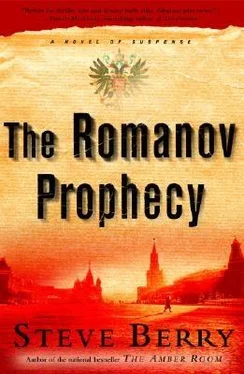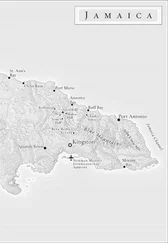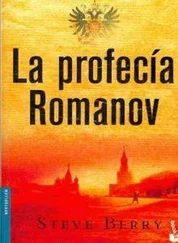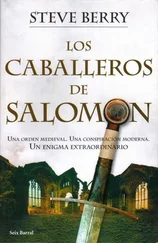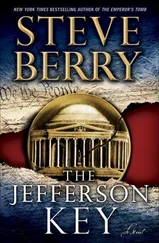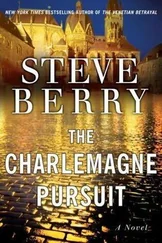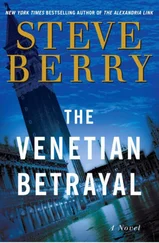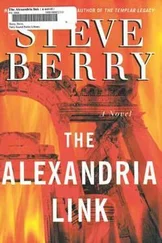Steve Berry - The Romanov Prophecy
Здесь есть возможность читать онлайн «Steve Berry - The Romanov Prophecy» весь текст электронной книги совершенно бесплатно (целиком полную версию без сокращений). В некоторых случаях можно слушать аудио, скачать через торрент в формате fb2 и присутствует краткое содержание. Жанр: Триллер, на английском языке. Описание произведения, (предисловие) а так же отзывы посетителей доступны на портале библиотеки ЛибКат.
- Название:The Romanov Prophecy
- Автор:
- Жанр:
- Год:неизвестен
- ISBN:нет данных
- Рейтинг книги:4 / 5. Голосов: 1
-
Избранное:Добавить в избранное
- Отзывы:
-
Ваша оценка:
- 80
- 1
- 2
- 3
- 4
- 5
The Romanov Prophecy: краткое содержание, описание и аннотация
Предлагаем к чтению аннотацию, описание, краткое содержание или предисловие (зависит от того, что написал сам автор книги «The Romanov Prophecy»). Если вы не нашли необходимую информацию о книге — напишите в комментариях, мы постараемся отыскать её.
The Romanov Prophecy — читать онлайн бесплатно полную книгу (весь текст) целиком
Ниже представлен текст книги, разбитый по страницам. Система сохранения места последней прочитанной страницы, позволяет с удобством читать онлайн бесплатно книгу «The Romanov Prophecy», без необходимости каждый раз заново искать на чём Вы остановились. Поставьте закладку, и сможете в любой момент перейти на страницу, на которой закончили чтение.
Интервал:
Закладка:
He needed to get back to Moscow and report to Taylor Hayes. It was possible that Stefan Baklanov's claim could be brought into question. There might be a pretender out there, someone with a bloodline closer to Nicholas II than Baklanov's. Sensationalist journalism and popular fiction had long proclaimed a pretender's existence. One movie studio had even released to millions of children a full-length animated feature on Anastasia that postulated her survival. But just as with Elvis and Jimmy Hoffa, the record was heavy on speculation and devoid of conclusive evidence.
Or was it?
Hayes hung up the phone and tried to control his temper. He'd traveled from Moscow to Green Glade for both business and relaxation. He'd left word for Lord at the hotel that he'd been called out of town and that he should continue in the archives, promising to get in touch with Lord by midafternoon. Intentionally, he did not include any means of location. But Ilya Zivon had been ordered to keep a close eye on Lord and to report everything.
"That was Zivon," he said. "Lord spent the day in St. Petersburg going through the archives."
"You were unaware of this?" Lenin asked.
"Totally. I thought he was working in Moscow. Zivon said that Lord told him to drive to the airport this morning. They're taking the Red Arrow back to Moscow tonight."
Khrushchev was openly agitated. Rare for him, Hayes thought. Of the five, the government representative stayed the coolest, rarely raising his voice. He was also careful with his vodka, perhaps thinking sobriety gave him an edge.
Stefan Baklanov was gone from Green Glade, driven the previous day to another property not far away where he could be kept secluded until his first appearance before the commission in two days. It was a little past seven PM and Hayes should have been headed back to Moscow. He was just about to leave when the call came from St. Petersburg.
"Zivon slipped away at dinner and called his employers. They directed him here," Hayes said. "He also said that Lord talked to a man at the archives yesterday in Moscow. Semyon Pashenko was the name. The hotel concierge told Zivon this morning that Lord had drinks with a man of the same description last evening."
"And the description?" Khrushchev asked.
"Late fifties, early sixties. Thin. Light blue eyes. Bald. Start of a beard on his face and neck."
Hayes observed the look exchanged between Lenin and Khrushchev. He'd sensed all week they were keeping something from him, and he was liking the situation less and less. "Who is he? Since you obviously know."
Lenin sighed. "A problem."
"That much I gather. How about details?"
Khrushchev said, "Have you ever heard of the Holy Band?"
He shook his head.
"In the nineteenth century, Tsar Alexander II's brother started a group that came to be known by that name. The fear of assassination was tremendous at the time. Alexander had freed the serfs and wasn't popular. This Holy Band was something of a joke. Nothing but aristocrats who pledged themselves to defend the tsar's life. In reality they could hardly defend themselves and, in the end, Alexander died from an assassin's bomb. Pashenko heads a contemporary group made up of anything but amateurs. His Holy Band was formed sometime in the nineteen twenties, as best we can determine, and has survived to this day."
"That's after Nicholas II and his family were murdered," Hayes said. "There was no tsar to protect."
"But that is the problem," Lenin said. "Rumors have persisted for decades that descendants of Nicholas survived the massacre."
"Bullshit," Hayes said. "I've read about all the pretenders. They're nuts. Every one of them."
"Perhaps. But the Holy Band survives."
"Has this got something to do with what Lord found in the archives?"
"It has everything to do with it," Lenin said. "And now that Pashenko has made repeated contact, Lord must be dealt with immediately."
"Another hit?"
"Definitely. And tonight."
He decided not to argue the merits. "How am I supposed to get men to St. Petersburg before midnight?"
"Air transportation can be arranged."
"Care to tell me why this is so urgent?"
"Frankly," Khrushchev said, "details are not important. Suffice it to say, the problem could jeopardize everything we are working to achieve. This Lord is apparently a free spirit. One you cannot control. No more chances can be taken. Use the phone number we provided and have men dispatched. That chornye cannot be allowed to return to Moscow alive."
FOURTEEN
ST. PETERSBURG, 11:30 PM
Lord and his bodyguard arrived at the train station. The concrete platforms were clogged with people trudging past in heavy coats, some adorned with curly astrakhan wool collars, most clutching bulky suitcases or shopping bags. No one seemed to pay him any attention. And other than the man in the archives, whom he'd thought might be watching, he'd sensed no danger all day.
He and Zinov had enjoyed a leisurely dinner at the Grand Hotel Europe, then spent the rest of the evening in one of the lounges listening to a string quartet. He'd wanted to stroll Nevsky Prospekt, but Zinov had been hesitant about parading the streets at night. So they'd stayed inside and taken a taxi directly to the station, allowing just enough time to climb aboard.
The evening was cold and Uprising Square bustled with traffic. He imagined the bloody exchanges between tsarist police and demonstrators that had started the revolution in 1917, the battle for control of the square raging for two days. The train station itself was another Stalinist creation, the grandiose green-and-white facade more fitting for a palace than a rail terminal. Next door, construction continued on a new high-speed rail terminal for a line being built to Moscow. The multibillion-dollar project was designed by an Illinois architectural firm, working through a British engineering concern, and the head architect had been present at the Volkhov briefing yesterday, understandably jittery about his future.
Lord had booked a first-class sleeping compartment with two berths. He'd ridden the Red Arrow express several times and recalled the days when sheets and mattresses were filthy, the compartments less than clean. But things had noticeably changed, the ride now regarded as one of the more luxurious in Europe.
The train left on time at 11:55 PM, which would put them in Moscow at 7:55 tomorrow morning. Four hundred and five miles in eight hours.
"I'm not all that sleepy," he told Zinov. "I think I'll go to the saloon car for a drink. You can wait here, if you like."
Zinov nodded and said he would catch a quick nap. Lord left the compartment and moved forward through two more sleeping cars, down a narrow, one-person-wide corridor. A trace of coal smoke from a samovar at the far end of each car burned his eyes.
The saloon car was equipped with comfortable leather seats and oak adornments. He took a window table and, in the gloomy light, watched the countryside whiz past.
He ordered a Pepsi, his stomach not in the mood for vodka, and opened his briefcase, reviewing the notes made earlier on the documents he'd found. He was convinced that he'd stumbled onto something, and he wondered what effect any of it would have on Stefan Baklanov's claim.
There was a lot at stake-to Russia, as well as to the corporations Pridgen amp; Woodworth represented. He didn't want to do anything to jeopardize either's future, or his own with the firm.
But there was no denying his lingering doubts.
He rubbed his eyes. Damn, he was tired. Late hours were nothing unusual, but the strain from the past few weeks was beginning to wear on him.
He settled back in the plush leather seat and sipped his drink. There certainly had been no class in law school on any of this. And twelve years of clawing his way up the firm had not prepared him, either. Lawyers like him were supposed to work in offices, courthouses, and libraries, the only intrigue being how to bill enough to make the effort worthwhile, and how to garner recognition from senior partners like Taylor Hayes-people who would ultimately make the decision on his future.
Читать дальшеИнтервал:
Закладка:
Похожие книги на «The Romanov Prophecy»
Представляем Вашему вниманию похожие книги на «The Romanov Prophecy» списком для выбора. Мы отобрали схожую по названию и смыслу литературу в надежде предоставить читателям больше вариантов отыскать новые, интересные, ещё непрочитанные произведения.
Обсуждение, отзывы о книге «The Romanov Prophecy» и просто собственные мнения читателей. Оставьте ваши комментарии, напишите, что Вы думаете о произведении, его смысле или главных героях. Укажите что конкретно понравилось, а что нет, и почему Вы так считаете.
